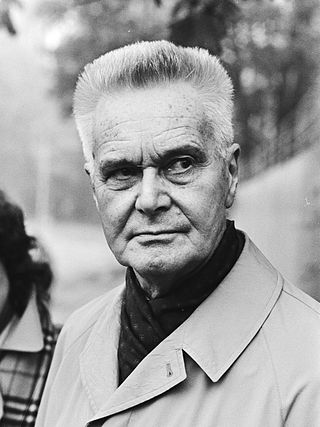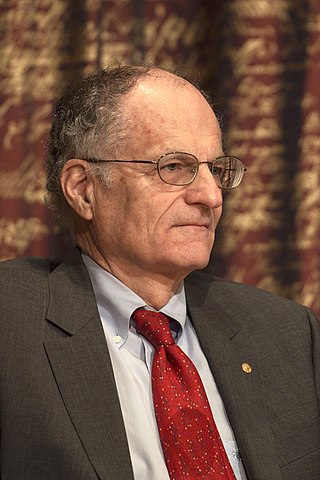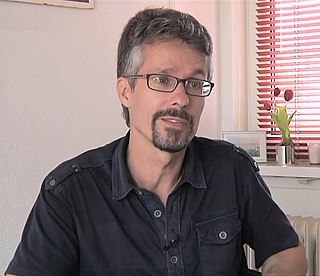
Robert Emerson Lucas Jr. is an American economist at the University of Chicago, where he is currently the John Dewey Distinguished Service Professor Emeritus in Economics and the College. Widely regarded as the central figure in the development of the new classical approach to macroeconomics, he received the Nobel Prize in Economics in 1995 "for having developed and applied the hypothesis of rational expectations, and thereby having transformed macroeconomic analysis and deepened our understanding of economic policy". He has been characterized by N. Gregory Mankiw as "the most influential macroeconomist of the last quarter of the 20th century." As of 2020, he ranks as the 11th most cited economist in the world.

Jan Tinbergen was a Dutch economist who was awarded the first Nobel Memorial Prize in Economic Sciences in 1969, which he shared with Ragnar Frisch for having developed and applied dynamic models for the analysis of economic processes. He is widely considered to be one of the most influential economists of the 20th century and one of the founding fathers of econometrics.

John Brian Taylor is the Mary and Robert Raymond Professor of Economics at Stanford University, and the George P. Shultz Senior Fellow in Economics at Stanford University's Hoover Institution.

Thomas John Sargent is an American economist and the W.R. Berkley Professor of Economics and Business at New York University. He specializes in the fields of macroeconomics, monetary economics, and time series econometrics. As of 2020, he ranks as the 29th most cited economist in the world. He was awarded the Nobel Memorial Prize in Economics in 2011 together with Christopher A. Sims for their "empirical research on cause and effect in the macroeconomy".

Lars Peter Hansen is an American economist. He is the David Rockefeller Distinguished Service Professor in Economics, Statistics, and the Booth School of Business, at the University of Chicago and a 2013 recipient of the Nobel Memorial Prize in Economics.

Christopher Albert Sims is an American econometrician and macroeconomist. He is currently the John J.F. Sherrerd '52 University Professor of Economics at Princeton University. Together with Thomas Sargent, he won the Nobel Memorial Prize in Economic Sciences in 2011. The award cited their "empirical research on cause and effect in the macroeconomy".
Phillip David Cagan was an American scholar and author. He was Professor of Economics Emeritus at Columbia University.
Shlomo Weber is an economics professor and ex-Rector, New Economic School in Moscow, Russia; Academic Director of the Center for Study of Diversity and Social Interactions at NES; Robert H. and Nancy Dedman Trustee Professor of Economics Department of Economics, Southern Methodist University.

The neoclassical synthesis (NCS), neoclassical–Keynesian synthesis, or just neo-Keynesianism was a neoclassical economics academic movement and paradigm in economics that worked towards reconciling the macroeconomic thought of John Maynard Keynes in his book The General Theory of Employment, Interest and Money (1936). It was formulated most notably by John Hicks (1937), Franco Modigliani (1944), and Paul Samuelson (1948), who dominated economics in the post-war period and formed the mainstream of macroeconomic thought in the 1950s, 60s, and 70s.

The Barcelona School of Economics (BSE) is an institution for research and graduate education in economics, finance, data science, and the social sciences located in Barcelona, Spain.

Jordi Galí is a Spanish macroeconomist who is regarded as one of the main figures in New Keynesian macroeconomics today. He is currently the director of the Centre de Recerca en Economia Internacional at Universitat Pompeu Fabra and a Research Professor at the Barcelona Graduate School of Economics. After obtaining his doctorate from MIT in 1989 under the supervision of Olivier Blanchard, he held faculty positions at Columbia University and New York University before moving to Barcelona.
Neil Wallace is an American economist and professor of economics at Penn State University. He is considered one of the main proponents of new classical macroeconomics in the field of economics.

Dennis J. Snower is an American-German economist, specialising in macroeconomic theory and policy, labor economics, digital governance, social economics, and the psychology of economic decisions in "caring economics". He is President of the Global Solutions Initiative in Berlin, Professorial Research Fellow at the Institute for New Economic Thinking at Oxford University, Fellow at the New Institute in Hamburg, and Non-resident Fellow of the Brookings Institution in Washington, D.C. He is former president of the Kiel Institute for the World Economy. His prominent labor research explores the role of “insiders” and “outsiders” in generating unemployment and macroeconomic fluctuations; his socio-economic research examines how social groups shape economic behavior; his psycho-economic research explains how economic decisions depend on psychological motives; and his macroeconomic research investigates why inflation and unemployment can move in opposite directions even in the long run.
Truman Fassett Bewley is an American economist. He is the Alfred Cowles Professor of Economics at Yale University. Originally specializing in mathematical economics and general equilibrium theory, since the late 1990s Bewley has gained renown for his work on sticky wages. In Bewley's 1999 book Why Wages Don't Fall During a Recession, hundreds of interviews with executives, labor leaders, and other professionals establish morale as an important factor in why businesses are reluctant to decrease employee compensation at times of low demand.
Xavier Vives is a Spanish economist regarded as one of the main figures in the field of industrial organization and, more broadly, microeconomics. He is currently Chaired Professor of Regulation, Competition and Public Policies, and academic director of the Public-Private Sector Research Center at IESE Business School in Barcelona.

Jennifer Hunt is a professor of economics at Rutgers University. She previously served as deputy assistant secretary for microeconomic analysis at the U.S. Department of the Treasury after serving a term as Chief Economist to the U.S. Secretary of Labor, serving under acting secretary Seth Harris and Secretary Thomas Perez. She is a research associate at the National Bureau of Economic Research. She has done research in the areas of employment and unemployment policy, immigration, wage inequality, transition economics, crime and corruption. Her past research focused on immigration and innovation in the United States, the U.S. science and engineering workforce, and the 2008-2009 recession in Germany. Her research on immigration has been cited by media in the context of immigration reform legislation, currently under consideration by the U.S. Congress. Her contemporary research focuses primarily on the geographic composition of technology, discrimination, and unemployment.

Jeroen Cornelis Johannes Maria van den Bergh is an environmental economist of Dutch origin. As of January 2015 he was ICREA Research Professor at Universitat Autònoma de Barcelona and Deputy Director for Research of its Institute of Environmental Science and Technology, and professor of Environmental and Resource Economics at VU University Amsterdam.
Barbara Rossi is an ICREA professor of economics at Universitat Pompeu Fabra, a Barcelona GSE Research Professor, a CREI affiliated professor and a CEPR Fellow. She is a founding fellow of the International Association of Applied Econometrics, a fellow of the Econometric Society and a director of the International Association of Applied Econometrics.

Andrew John Scott is a British economist, currently Professor of Economics at London Business School, known for his work on longevity and macroeconomics. Previously he was a lecturer at Oxford University, a visiting professor at Harvard University and a researcher at the London School of Economics.

The UCL Department of Economics is one of nine Departments and Institutes within the Faculty of Social and Historical Sciences at University College London. It is the oldest department of economics in England and is research-intensive, currently headed by Professor Antonio Guarino.













